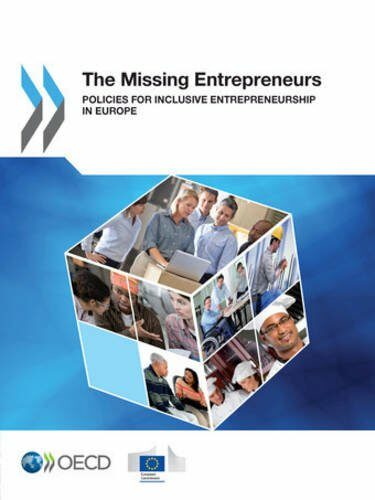

THE MISSING ENTREPRENEURS
The digital transformation of the economy is re-shaping the way people work and do business. New ways of working and doing business are affecting the types of skills needed, including innovation and entrepreneurship. Many sectors are undergoing rapid technological change and digital skills are needed for all jobs, from the simplest to the most complex.
BACKGOUND
As stated in the latest OECD report on “The Missing Entrepreneurs 2019 - Policies for inclusive entrepreneurship”, digital entrepreneurship – the creation of digital businesses and the adoption of digital technologies by existing entrepreneurs – may hold potential for making entrepreneurship more inclusive. Under-represented population groups in entrepreneurship could be more likely to benefit from certain features of digital technologies for business creation and growth, including the lower start-up costs required for many digital businesses and
the wider access to external markets offered by the internet. However, international surveys indicate that women, immigrants, youth and seniors are greatly under-represented among digital entrepreneurs in the EU (Eurostat, Labour Force Survey, 2019). For example, it is estimated that women accounted for only 15.6% of digital start-ups in 2018, which was essentially unchanged from 2016 (14.8%). This is well below their share among entrepreneurs.
As pointed by OECD, these gaps are due to many factors, including a lack of digital entrepreneurship role models and a lack of digital skills, which affects seniors and women. Moreover, several recent studies show that many obstacles to business creation (e.g. lack of skills, access to finance, small and ineffective networks) carry over into the digital economy. Data on computer usage clearly show that women and seniors have gaps in basic digital skills, as do some groups of youth. These skills barriers reinforce the obstacles to start-up financing and networks.
Therefore, the policy recommendations outline the need for actions contributing to address the barriers to digital entrepreneurship through schemes that build digital and entrepreneurship skills, including through education, training programmes and facilitating peer-learning.

AIM & OBJECTIVES
In the light of the above, our project - the Missing Entrepreneurs – arises with the ambition to contribute directly to these emerging challenges. Our aim is to build a more inclusive culture towards digital start-ups and support the development of digital and entrepreneurship skills among vulnerable and still under-represented population groups in digital entrepreneurship such as women, immigrants, youth and seniors. To this end, a set of specific objectives have been defined, drawn from the “policy recommendations” of the OECD report “The Missing Entrepreneurs 2019” (pp.178-179), and completed with other objectives in order to form a coherent project structure. The specific objectives are:
Develop a comprehensive framework of digital skill gaps
Develop a comprehensive framework of digital skill gaps of under-represented population groups (women, immigrants, youth and seniors) in digital entrepreneurship. This skill gaps mapping will be carried out in participating countries (France, Portugal, Spain, Italy, Cyprus and Austria) and on the European level, allowing to identify common trends and shared understanding against two EU competence frameworks for digital competences and entrepreneurship.
Establish European Academy on Inclusive Digital Entrepreneurship
Extensive database of online training courses that leverages all available e-learning resources on entrepreneurships and digital skills.
Practical training modules and “training pills” on digital tools available for digital entrepreneurship and digital transformation of businesses.
Enhance digital and entrepreneurial skills
By deploying training courses and workshops to testing a set of innovative education materials and resources provided by European
Academy on Inclusive Digital Entrepreneurship. This will allow to train at least 180 people that belongs to project target groups (women, immigrants, youth and seniors) on digital entrepreneurship by the end of the project.
Develop far-reaching educational and raising awareness
Awareness campaign to combat the stereotype that digital entrepreneurs are young males by showcasing a wide range of role models
and success stories.


This project has been funded with support from the European Commission. This publication reflects the views only of the author, and the Commission cannot be held responsible for any use which may be made of the information contained therein.

The Missing Entrepreneurs Project aims to build a more inclusive culture towards digital start-ups and support the development of digital and entrepreneurship skills among vulnerable and still under-represented population groups in digital entrepreneurship such as women, immigrants, youth and seniors.Project reference number: 2020-1-FR01-KA204-080632
Click the following button to contact us!

